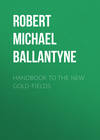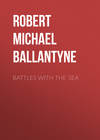Читать книгу: «Saved by the Lifeboat», страница 2
“Yes, sir, it was.”
“Very well; report the matter without delay. I will go to Covelly to-night, and shall probably be back to-morrow.”
Saying this, Mr Webster left the office, and, on the evening of that day, found himself seated in Captain Boyns’s parlour, with little Annie on his knee. Her pretty head was on his shoulder, her fair curls straggled over his chest, and her round little arms tightly encircled his large body as far as they could reach, while she sobbed on his bosom and kissed him by turns.
This was quite a new experience in the life of the gold-lover. He had declined to submit to familiar caresses in former years, but on such an occasion as the present, he felt that common propriety demanded the sacrifice of himself to some extent. He therefore allowed Annie to kiss him, and found the operation—performed as she did it—much more bearable than he had anticipated; and when Annie exclaimed with a burst of enthusiasm, “Oh, dear, dear papa, I did feel such a dreadful longing for you when the waves were roaring round us!” and gave him another squeeze, he felt that the market price of the bundle of goods on his knee was rising rapidly.
“Did you think you were going to be drowned, dear?” said Mr Webster with the air of a man who does not know very well what to say.
“I’m not sure what I thought,” replied Annie smiling through her tears. “Oh, I was so frightened! You can’t think, papa, how very dreadful it is to see the water boiling all round, and sometimes over you; and such awful thumping of the ship, and then the masts breaking; but what I feared most was to see the faces of the sailors, they were so white, and they looked as if they were afraid. Are men ever afraid, papa?”
“Sometimes, Annie; but a white face is not always the sign of fear—that may be caused by anxiety. Did any of them refuse to obey orders?”
“No; they were very obedient.”
“Did any of them get into the lifeboat before you and nurse!”
“Oh, no; they all refused to move till we were put into it, and some of them ran to help us, and were very very kind?”
“Then you may be quite sure they were not afraid, however pale their faces were; but what of yourself, Annie—were you afraid?”
“Oh, dreadfully, and so was poor nurse; but once or twice I thought of the text that—that—you know who was so fond of,—‘Call upon me in the time of trouble and I will deliver thee,’ so I prayed and felt a little better. Then the lifeboat came, and, oh! how my heart did jump, for it seemed just like an answer to my prayer. I never felt any more fear after that, except when I fell into the sea; but even then I was not so frightened as I had been, for I felt somehow that I was sure to be saved, and I was right, you see, for dear Captain Boyns dived for me. I love Captain Boyns!” cried Annie, and here again she kissed her father and held him so tight that he felt quite angry with Mrs Niven, who entered at the moment, and said, apologetically—
“Oh! la, sir, I didn’t know as Miss Annie was with you. I only came to say that everythink is ready, sir, for going ’ome.”
“We don’t intend to go home,” said Mr Webster; “at least not for a day or two. I find that Captain Boyns can let us stay here while I look after the wreck, so you can go and arrange with Mrs Boyns.”
During the few days that Mr Webster remained at Coral Cottage (Captain Boyns’s residence), Mrs Niven found, in the quiet, sympathetic Mrs Boyns, if not a congenial friend, at least a kind and sociable hostess, and Annie found, in Harry Boyns, a delightful companion, who never wearied of taking her to the cliffs, the shore, and all the romantic places of the neighbourhood, while Mr Webster found the captain to be most serviceable in connection with the wreck. One result of all this was that Mr Webster offered Captain Boyns the command of one of his largest vessels, an offer which was gladly accepted, for the captain had, at that time, been thrown out of employment by the failure of a firm, in the service of which he had spent the greater part of his nautical career.
Another result was, that Mr Webster, at Annie’s earnest solicitation, agreed to make Covelly his summer quarters next year, instead of Ramsgate, and Mrs Boyns agreed to lodge the family in Coral Cottage.
This having been all settled, Mr Webster asked Captain Boyns, on the morning of his departure for Liverpool, if he could do anything more for him, for he felt that to him his daughter owed her life, and he was anxious to serve him.
“If you could give my son Harry something to do, sir,” said Boyns, “you would oblige me very much. Harry is a smart fellow and a good seaman. He has been a short time in the coasting trade; perhaps—”
“Well, yes, I’ll see to that,” interrupted Mr Webster. “You shall hear from me again as to it.”
Now the fact is that Mr Webster did not feel attracted by young Boyns, and he would willingly have had nothing to do with him, but being unable to refuse the request after having invited it, he ultimately gave him a situation in one of his coasting vessels which plied between London and Aberdeen.
About a year after that, Captain Boyns sailed in the Warrior, a large new ship, for the Sandwich Islands and the Chinese seas.
True to his promise, Mr Webster spent the following summer with Annie and Mrs Boyns at Covelly, and young Boyns so managed matters that he got his captain to send him down to Covelly to talk with his employer on business. Of course, being there, it was natural that he should ask and obtain leave to spend a few days with his mother; and, of course, it was quite as natural that, without either asking or obtaining leave, he should spend the whole of these days in roaming about the shore and among the cliffs with Annie Webster.
It would be absurd to say that these two fell in love, seeing that one was only seven and the other fifteen; but there can be no doubt they entertained some sort of regard for each other, of a very powerful nature. The young sailor was wildly enthusiastic, well educated, manly, and good-looking—little wonder that Annie liked him. The child was winning in her ways, simple, yet laughter-loving, and very earnest—less wonderful that Harry liked her!
Another year fled, and again the Websters visited Covelly, and again Harry spent a few days with his mother; and although Mr Webster did not get the length of liking the youth, he at last came to the condition of not disliking him.
Year followed year, and still, each summer, Annie pressed her father to return to the old place, and he agreed, chiefly because it mattered little to him where he went. He regarded the summer trip in the light of a penance to be paid for the sin of being a member of society and the head of a household, and placed every minute so wasted to the debit of the profit and loss account in the mental ledger of his life’s affairs, for it must not be supposed that Mr Webster’s character was changed by the events which followed the rescue of his child from the sea. True, he had been surprised out of his habitual hardness for a short time, but he soon relapsed, if not quite back to the old position, at least so near to it that the difference was not appreciable.
As time ran on, men begun to look for the return of the Warrior, but that vessel did not make her appearance. Then they began to shake their heads and to grow prophetic, while those who were most deeply interested in the human beings who manned her became uneasy.
“Don’t fret over it,” said Harry one day to his mother, in a kind, earnest tone; “you may depend upon it father will turn up yet and surprise us. He never lost a ship in his life, and he has sailed in worse ones than the Warrior by a long way.”
“It may be so,” replied Mrs Boyns, sadly; “but it is a long, long time since he went away. God’s will be done. Whether He gives or takes away, I shall try to bless His name.”
At last Harry gave over attempting to comfort his mother, for he began to fear that his father’s ship was destined to be placed on the dark, dreary list of those of which it is sometimes said, with terrible brevity, in the newspapers, “She sailed from port on such and such a day, and has not since been heard of.”
In course of time Harry made one or two trips to the East Indies as first mate of one of Mr Webster’s vessels, and ultimately obtained the command of one.
At last a day came when there appeared in a Welsh newspaper a paragraph, which ran thus:– “A Message from the Sea—A bottle, corked and sealed, was found by a woman on the beach, above Conway, North Wales. Inside was a letter containing the following:—
“‘Latitude 44, longitude 15, off Tierra del Fuego. If this should ever reach the shores of England, it will announce to friends at home the sad fate of the ship Warrior, which sailed from Liverpool on 13th February 18 hundred and something, bound for China. We have been boarded by pirates: we have been all locked into the cabin, with the assurance that we shall be made to walk the plank in half an hour. Our last act is to put this in a bottle and drop it overboard. Farewell, for this world, my beloved wife and son.’
“‘Daniel Boyns, Captain.’”
This letter was forwarded to the owner, and by him was sent to poor Mrs Boyns.
Alas! how many sailors’ wives, in our sea-girt isle, have received similar “messages from the sea,” and lived under the dark cloud of never-ending suspense—hoping against hope that the dear lost ones might yet return!
Chapter Three
Shows what some men will do and dare for money, and what sometimes comes of it
We must now beg the reader’s permission to allow a few more years to elapse. Eight have come and gone since the dark day when poor Mrs Boyns received that message from the sea, which cast a permanent cloud over her life. Annie Webster has become a beautiful woman, and Harry Boyns a bronzed stalwart man.
But things have changed with time. These two seldom meet now, in consequence of the frequent absence of the latter on long voyages, and when they do meet, there is not the free, frank intercourse that there used to be. In fact, Mr Webster had long ago begun to suspect that his daughter’s regard for the handsome young sailor was of a nature that bade fair to interfere with his purposed mercantile transactions in reference to her, so he wisely sent him off on voyages of considerable length, hoping that he might chance to meet with the same fate as his father, and wound up by placing him in command of one of his largest and most unseaworthy East Indiamen, in the full expectation that both captain and vessel would go to the bottom together, and thus enable him, at one stroke, to make a good round sum out of the insurance offices, and get rid of a troublesome servant!
Gloating over these and kindred subjects, Mr Webster sat one morning in his office mending a pen, and smiling in a sardonic fashion to the portrait of his deceased wife’s father, when a tap came to the door, and Harry Boyns entered.
“I have come, sir,” he said, “to tell you that the repairs done to the Swordfish are not by any means sufficient. There are at least—”
“Please do not waste time, Captain Boyns, by entering upon details,” said Mr Webster, interrupting him with a bland smile: “I am really quite ignorant of the technicalities of shipbuilding. If you will state the matter to Mr Cooper, whom I employ expressly for—”
“But, sir,” interrupted Harry, with some warmth, “I have spoken to Mr Cooper, and he says the repairs are quite sufficient.”
“Well, then, I suppose they are so.”
“I assure you, sir,” rejoined Harry, “they are not; and as the lives of passengers as well as men depend upon the vessel being in a seaworthy condition, I do trust that you will have her examined by some one more competent to judge than Mr Cooper.”
“I have no doubt of Mr Cooper’s competence,” returned Mr Webster; “but I will order a further examination, as you seem so anxious about it. Meanwhile I hope that the ship is being got ready for sea as quickly as possible.”
“There shall be no delay on my part, sir,” said Harry, rising; “the ship has been removed from the Birkenhead Docks, in which you are aware she has lain for the last eight months, and is now lying in the Brunswick Dock, taking in cargo. But I think it a very serious matter, which demands looking into, the fact that she had no sooner grounded in the dock, than she sprang a leak which instantly let twenty-eight inches of water into her, and twice, subsequently, as much as forty inches have been sounded. Yet no repairs worthy of the name have been made. All that has been done is the pumping of her out daily by the stevedore’s men when their stowing work is finished.”
“Has the agent for the underwriters visited her?” inquired Mr Webster.
“He has, sir, but he seems to be of opinion that his responsibility is at an end because a surveyor from the Mersey Docks and Harbour Board had previously visited her, and directed that she should not be loaded deeper than twenty-one feet—chalking on the side amidships the six feet six inches clear beneath which she is not to be allowed to sink.”
“Well, well,” said Mr Webster, somewhat impatiently, “I will have the matter looked into. Good morning, Captain Boyns.”
The captain bowed and left the office, and Mr Webster leant back in his chair, clasped his hands, twirled his thumbs, and smiled grimly at the old gentleman over the fireplace.
True to his word, however, he had an inspection made of the Swordfish. The inspector was of a kindred spirit with Mr Webster, so that his report was naturally similar to that of Mr Cooper. Nothing, therefore, was done to the vessel—“nothing being needed”—and the loading went on in spite of the remonstrances of Captain Harry Boyns, who, with all the energy and persistency of his character, continued to annoy, worry, and torment every one who possessed the faintest right or power to interfere in the matter—but all to no purpose; for there are times when neither facts nor fancies, fair words nor foul, fire, fury, folly, nor philosophy, will avail to move some “powers that be!”
In a towering fit of indignation Harry Boyns resolved to throw up his situation; but it occurred to him that this would perhaps be deemed cowardice, so he thought better of it. Then he madly thought of going direct to the President of the Board of Trade and making a solemn protest, backed by a heart-stirring appeal; but gave up that idea on recalling to memory a certain occasion on which a deputation of grave, learned, white-haired gentlemen had gone to London expressly to visit that august functionary of the State, and beseech him, with all the earnestness that the occasion demanded, that he would introduce into Parliament a bill for the better regulation and supervision of ships, and for preventing the possibility of seamen and passengers being seduced on board unseaworthy vessels, carried off to sea, and there murderously drowned in cold blood, as well as in cold water; which deputation received for answer, that “it was not the intention of Government, as at present advised, to introduce a measure for providing more stringent enactments as to the equipments, cargoes, and crews of passenger vessels!”—a reply which was tantamount to saying that if the existing arrangements were inadequate to the ends desired, Government saw no way out of the difficulty, and people must just be left unprotected, and go to sea to be drowned or spared according as chance or the cupidity of shipowners might direct!
This was pretty resolute on the part of Government, considering that above a thousand lives were then, and above two thousand still are, lost annually on the shores of the United Kingdom; a very large number of which—if we may believe the argument of facts and the pretty unanimous voice of the press—are sacrificed because Government refuses to interfere effectively with the murderous tendencies of a certain class of the community!
When Harry Boyns thought of all this he sighed deeply, and made up his mind to remain by the Swordfish, and sink or swim with her. Had he been more of a man of business, perhaps he might have been more successful in finding out how to have prevented the evil he foresaw; but it was the interest of the owner to keep him in the dark as much as possible, for which end Mr Webster kept him out of the ship’s way as much as he could, and when that was impossible, he kept him so busily employed that he remained ignorant of a great deal that was said and done in regard to his vessel.
At length the Swordfish left the Brunswick Dock, six inches deeper than the surveyor had directed, and was towed to the Wellington Dock, where she took in 120 tons of coke, and sank still deeper. Harry also discovered that the equipment of the ship was miserably insufficient for the long voyage she was intended to make. This was too much for him to bear. He went at once to Mr Webster’s office and said that if a deaf ear was to be turned any longer to his remonstrances he would throw up his appointment.
Poor Harry could scarcely have taken a more effective step to insure the turning of the deaf ear to him.
“Oh!” replied Mr Webster, coolly, “if you refuse to take charge of my vessel, Captain Boyns, I will soon find another to do it.”
“I certainly do refuse,” said Harry, preparing to leave the office, “and I think you will find some difficulty in getting any other man to go to sea in such a ship.”
“I differ from you, Captain Boyns. Good afternoon.”
“And if you do, and lives should be lost in consequence,” added Harry, grasping the handle of the door, “I warn you solemnly, that murder will have been committed by you, whatever the law may say on the subject.”
“Good afternoon, Captain Boyns.”
“You’ve got a hard master,” said Harry to Grinder as he passed through the outer office.
The confidential clerk shook his head in a deprecatory way, and smiled.
Next moment Harry Boyns found himself in the street—with nothing to do, and the wide world before him!
Meanwhile, the loading of the Swordfish went on—also the pumping of her. That same day she was visited by a surveyor from the Underwriters’ Association, who found her only five feet clear above water, and still taking in cargo. That gentleman called in another surveyor to a consultation, who agreed with him in pronouncing her overladen. She was represented as such to the local Underwriters’ Association for which the surveyor acted, but as the Swordfish was insured in London and not with them, the Liverpool underwriters did not consider themselves called upon to interfere. Their surveyor, however, visited the vessel again, a few days later, when he found her “only four feet clear,” and declared that, so far from going to Bombay, he should not like to attempt to cross to Dublin in her in anything like rough weather.
Now it must be observed that all these consultations and investigations took place in a quiet way. To the public eye all was “fair and above board.” Few among the thousands who visited the docks knew much about deep loading; still less about adequate equipping. They saw nought but a “noble ship,” well painted, washed, gilded, and varnished, taking merchandise into her insatiable hold, while the “Yo-heave-ho” of the seamen rang out cheerily to the rattling accompaniment of chains and windlass. Many other ships were there, similarly treated, equally beautiful, and quite as worthy of the titles “good” and “noble” as the whited sepulchre is to be styled pure.
A few days before the Swordfish was ready for sea, a new captain was sent down to her. This captain was not a “bad man” in the worst sense of that term—neither was he a “good” one. Vigour, courage, resolution when acting in accordance with his inclinations—these were among his characteristics. But he was a reckless man, in want of money, out of employment, and without an appreciable conscience. In the circumstances, he was glad to get anything to do, and had been so long ashore and “in trouble,” that he would probably have agreed to take command of and go to sea in a washing-tub if part paid beforehand for doing so.
Nevertheless, even this man (Captain Phelps by name) felt some degree of nervous anxiety on getting on board and examining the state of the ship. On further acquaintance with her, he was so dissatisfied that he also resolved to throw up his appointment. But he had obtained the berth through the influence of a friend who happened to be acquainted with Mr Webster. This “friend” wrote him a stern letter, saying, if he ventured to do as he proposed, he should never have a ship out of Liverpool again, as long as he (the friend?) could prevent it!
Captain Phelps was one of those angry men of iron mould, who appear to take pleasure in daring Fate to do her worst. On receipt of the letter, he swore with an awful oath that he would now go to sea in the Swordfish, even if he knew she would go to the bottom in twenty-four hours after weighing anchor. Accordingly, having intrenched himself behind a wall of moral adamant, he went about with quiet indifference, and let things take their course. He made no objection whatever when, in addition to the loading already in the ship, the agents added a deck cargo of some massive pieces of machinery, weighing thirty tons, and a supply of coals, the proper receptacle for which below had been filled with iron goods. Neither did he utter a word when—after the vessel had been taken out into the stream by the riggers—he and the owner, agents, pilot, and crew (only six of which last were A.B.’s), were taken off to her in a tug and put on board with orders to sail immediately.
Only a few passengers were going. These were already on board, but some of their friends went off in the tug to bid them a last farewell.
This was a sad scene, but the captain regarded it with stoical indifference. There was a stout, hale old Indian officer going out on a pleasure trip to his beloved East, and a daughter of the same whom he hoped to get married “offhand, comfortably there.” There was a sick nephew of the old officer, going the voyage for the benefit of his health, on whose wan countenance consumption, if not death, had evidently set a deep mark. There were, also, a nurse and a lady’s-maid, and two girls of ten or thirteen years of age—sisters—who were going to join their father and mother, besides one or two others. Earnest loving words passed kindly between these and their relatives and friends as the moment of parting drew near.
“Don’t forget to remember me to Coleman and the rest of ‘ours,’” cried a stout elderly man, waving his hand as the tug moved off.
“That I won’t, and I shall expect to shake you by the hand again, old fellow, in a year or two.”
“You’ll never see him again,” thought Captain Phelps, as he stood with compressed lip and frowning eye on the quarter-deck.
“Good-bye, darling Nelly,” cried a lady to one of the sobbing girls from whom she was parting; “remember the message to mamma.”
“Oh! yes,” exclaimed the child, trying to look bright, “and we won’t be very long of coming back again.”
“You’ll never come back again,” thought the captain, and he sighed very slightly as the thought passed through his brain.
“Look alive there, lads,” exclaimed the pilot, as the tug sheared away.
Soon the anchor was at the bows, the sails were shaken out, and the Swordfish began her voyage.
“There’s not a piece of spare rope aboard, sir,” said the first mate, coming up to the captain with a blank look; “we can’t even get enough to cat and fish the anchor.”
“You can unreeve the tops’l halyards,” replied the captain, quietly.
This was done, and the anchor was secured therewith.
“How much water in the hold?” asked the captain.
“Three feet, sir; the carpenter has just sounded. It seems that the riggers were at work on the pumps when we came out in the tug, but were stopped by the agents before we got alongside. I fear she is very leaky, sir,” said the mate.
“I know she is,” replied the captain; “keep the men at the pumps.”
That night the weather became what sailors call “dirty,” and next morning it was found that the water had mounted to 4 feet 10 inches. The pumps had become almost unworkable, being choked with sand, and it became evident that the voyage thus inauspiciously begun would very soon be ended. During the day the “dirty” weather became gale, so that, although the wind was fair, Captain Phelps determined to run to the nearest port for shelter. With a “good ship” this might have been done easily enough—many a vessel does it during every gale that visits our stormy shores—but the Swordfish was by this time getting water-logged and unmanageable. She drifted helplessly before the gale, and the heavy seas broke over her continually, sweeping away everything moveable. Another night passed, and next morning—Sunday—it became plain that she was settling down so the captain gave orders to get out the long-boat, and told the passengers to get ready. Day had broken some time before this, but the weather was still so thick that nothing could be seen.
“Take a cast of the lead,” said the captain.
“Ay, ay, sir,” was the prompt reply, but before the order could be obeyed, the roar of breakers was heard above the howling of the storm, and the shout, “Land on the port bow!” was instantly followed by “Down with the helm!” and other orders hurriedly given by the captain and hastily obeyed by the men. All too late! The ship was embayed. As if to make their position more painful, the mists cleared partially away, and revealed the green fields and cottages on shore, with the angry sea—an impassable caldron of boiling foam—between.
Another instant and the ship struck with a convulsive quiver from stem to stern. The billows flew madly over her, the main-mast went by the board—carrying two of the men to their doom along with it—and the Swordfish, “bound for Bombay,” was cast, a total wreck, upon the coast of Cornwall.
Покупайте книги и получайте бонусы в Литрес, Читай-городе и Буквоеде.
Участвовать в бонусной программе




















